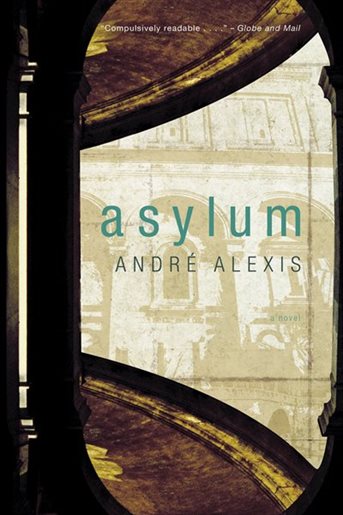
Asylum, by André Alexis, is a novel about conservatism. Not necessarily an ideological conservatism, but the soft conservatism associated with words like tradition, memory, story and history. Asylum opens with a cloistered narrator (what could be more conservative than a devout religious?) who has lived for fourteen years in a monastery near Florence. Yet his equanimity has been disturbed lately by recollections of earlier times in Ottawa. The narrator had been a young hanger-on at the Fortnightly Club, an informal group of suburbanites who aspired to an intellectual life which included conversations about Plato and Kant. And so we drift back in time with the narrator to share in the lives of an odd assortment of people whose lives intersected at or were somehow influenced by these twice-weekly gatherings.
The club included Franklin, a conservative political wonk (okay, so the novel does contain a small dose of ideological conservatism) who develops an abiding passion for prison reform. He is haunted by the image of a black man he saw while on a tour of the Kingston pen. Their eyes met and the man smiled and it affected Franklin deeply. He believes that architecture affects our souls. He wants to build a prison whose architecture enhances the lives of the prisoners who must live within its walls:
But why shouldn’t prisons be civilized? That was the question, and it brought with it a vision, not of a penitentiary but of a place created as art, an institution that helped strengthen community while instilling community at its noblest. Not simply a good-looking prison but one whose effect was ennobling on a number of levels: aesthetic, social, political, perhaps even religious. A building, that is, to civilize those who passed through it or lived within. A building that would do what great art does: enrich the soul.
He will call it “Alba” – white – and it will improve the nation.
Franklin has an opportunity to realize his vision when he is invited to join the staff of Albert Rundstedt (C – Calgary West), a cabinet minister in Brian Mulroney’s government. Rundstedt adopts the idea of “Alba” (he goes by the nickname “Alby”) as his own and uses it to enhance his political credibility (what conservative can turn his back on proposals for prison reform?) Bureaucratic machinations follow. Franklin enlists the help of an old friend named Reinhart, an artist trained as an architect, to provide designs that reflect his vision. The result is more like the Doges palace than a place to lock up criminals and it uses mountains of marble. Franklin enlists another friend, François, as a quantity surveyor who estimates that Reinhart’s designs will cost a quarter of a billion dollars. Oops! Still another friend, Edward, contracts “land consultants” to “persuade” reluctant land owners to sell lands at the proposed site. Etc. Naturally, there is no way the government can authorize such an expenditure. The prison comes to pass, but it’s a scaled-down version of its envisioned self and it fails to serve its original aims.
In a way, the account of a new prison in the Gatineaus stands as an allegory for the writing of a novel. Maybe it begins with a grand vision. But in the negotiations and fussing that happen in the day-to-day grind of writing it, something of its ideal gets lost. Time constraints and deadlines, not least of which is death, force the writer to curtail all that polishing and get on with putting the novel before the reader. Hmm …
Asylum is not just about conservatism. In form and execution, it is a conservative novel. It is not a modern novel, but hearkens to an earlier time just as Reinhart’s prison designs hearken to the architecture of Renaissance palaces. One might call the novel neo-Dickensian. It has a large cast of characters who figure in several different interwoven plot lines. As characters are introduced, we learn something of their backstory and read an intricate account of their motivations/aspirations/what-have-you. Yawn. All the plot lines are drawn together to produce a neat resolution. And it comes complete with its very own deus ex machinaOliver Twist rich relation.
Pervading Asylum is a political naiveté. While the politicians and their attendant wonks find themselves occasionally embroiled in scandal (this is Ottawa after all) nevertheless, the embroiling happens, not because they are corrupt, but because they are trusting and have been set up by more malevolent (possibly Liberal) forces. Brian Mulroney is a warm, decent, honest kind of a guy. No mention of Schreiber and the Airbus affair here, no sir. It’s Canadian conservatism through rose-coloured glasses. The problem is that the whole prison business, with all its talk of ennobling criminals through neo-Renaissance architecture, reads as parody. It’s hard to gauge just what tack Alexis is taking here. Or maybe it’s just a fact of life that conservatism, when it takes itself seriously, can’t help but read like parody.
A final note. Although Alexis was born in Trinidad and subsequently emigrated to Canada, issues of race and hyphenated identity do not figure prominently in his writing and not at all in Asylum. One might call him a post-racial writer. And yet … In a novel that uses the idea of prison as a determining metaphor, one can’t help but wonder why race is absent. Why even bother to mention Franklin’s visit to Kingston pen and the smiling black prisoner then? It seems irrelevant in light of everything that follows.